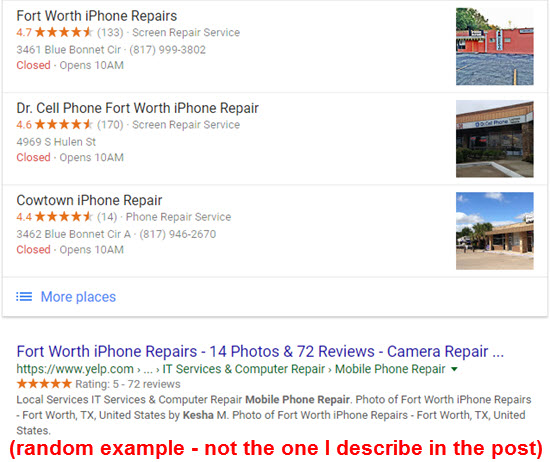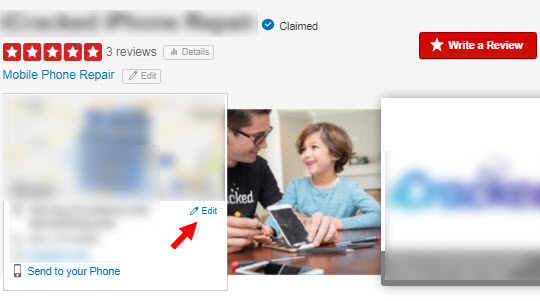“Barnacle” SEO, or the process of getting a page other than a page on your site to rank well in Google’s local organic search results, can be a great way to grab extra local visibility. If your competitors get barnacle SEO to work for them, more power to ‘em – if they do it in a fair and square way. If they don’t, you shouldn’t let it stand.
Yelp is the great-granddaddy barnacle site. Your competitors may use it in a gray-hat way, though. If your competitors use a fake or keyword-stuffed name in Yelp, and appear to have that page ranking well in Google as a result of that name, the chances are good you can scrape off some of that visibility. You probably know the real name of their business (or you can find out easily), and you can be pretty confident that the name has propped up their Yelp rankings artificially if they’re outranking businesses with many more or much-better reviews.

I dealt with that recently for a client of mine. One of his competitors had a Yelp page named simply “iPhone Repair.” That was not the real name of the business, but that didn’t stop the Yelp page from ranking #1 in the local organic results for “iPhone repair.” Well, I submitted an edit on that Yelp page. In the optional “comments” you can include in your edit I mentioned what the real name was and how I knew (it was on their site).

Yelp fixed the name a couple days later, and the page ranked #1 for a while longer: It took Google probably 10 days to re-index the Yelp page, at which time it dropped from #1 to #6 in the organic results, and fell off of page 1 completely a few days after that.
Sure felt good to scrape that barnacle off.
For all of Yelp’s MANY flaws big and small, it is better at policing spam than Google is. Plenty of spam still gets by Yelp, of course, but at least your anti-spam edits are less likely to be ignored. As SEOs and business owners, our first impulse is to go after spammy Google My Business pages. Which is fine and smart to do – as long as you also try to clean up spammy competitors’ Yelp pages. May not work in your case, but your chances are better.
A few other, less-obvious upshots of trying to fix spammy Yelp pages:
1. Unlike in Google My Business, it’s harder for spammy competitors simply to change back to their fake or keyword-stuffed names. Yelp can and perhaps will lock the “name” field of their page, even if it’s been owner-verified. Less potential for whac-a-mole.
2. Those competitors are less likely to rank well IN Yelp’s search results.
3. Those competitors probably benefit from the same fake-o name in Google My Business. If you can get Yelp to fix the name, Google may be more likely to fix the Google My Business name, too.
4. Because Yelp is the main data-provider for Apple Maps and Bing Places, getting a competitor’s name fixed on Yelp may undo any ill-gotten rankings they’ve gotten in Apple or Bing. (For what that’s worth.)
Local SEO barnacles grow easily, but that also means they’re low on the food chain.
—
What’s been your experience with anti-spam edits in Yelp – particularly of competitors’ names?
Any non-Yelp sites where you’ve been able to clean up competitors’ spam?
Any other war stories?
Leave a comment!



This is awesome, Phil! I check for competitor spam on Google Maps, but hadn’t thought about doing it on Yelp. Thanks for sharing!
Thanks, Justin!
Phil,
You remind of the raper 2Pac he used to rap about what’s happening in his life about the good and the bad thing and ppl loved it and listened to his music and loved it and got big followers but haterz shot him . till this day 1000’s of ppl still listen to his music .
You on the other side i love it how you show case in blog post client work that just build more trust.
you speaking of true work you have done and i guess that the reason many ppl read your new blog post every time you publish one , as new client of yours it builds even more trust how you have 3,790 followers on twitter and you only followed 96 .
i’m proud of you as person and proud to have you on my side. i hope other seo read this as motivation for them self and there company .
by the way have you thought of doing seo rap music lol just kidding. watch this post my rank for seo rap.
Thanks.
Anas
Hey, thanks, Anas.
Most of my posts are based on “real life” because there’s always something to observe and pass on.
Haven’t thought too much about a rap career, but I think my stage name would have to be Messy P.
Yelp told me on Twitter that virtual offices aren’t allowed (https://twitter.com/Yelp/status/966748800617533442) but I’ve had no luck getting them to remove any listings that are using them yet.
P.S. that last picture is so gross lol
Good old Yelp. They didn’t even answer your question. Based on that “answer,” I’d say they’re pulling a Google and leaving the “guidelines” broad intentionally.
In any case, I’ve not had any luck in getting them to remove virtual-office listings, either.
Our 3 cats think those barnacles look scrumptious 🙂
Just on your point # 4, is Yelp really that big for Bing and Apple maps? I’ve had my suspicions that this may be true in the US but here in Australia, it would seem to be more driven by Sensis who own Yellow & White pages + True Local – just curious.
Perhaps not in Australia. The data-providers often differ from country to country.
Nice one, Phil! This is a smart tactic that I hadn’t really considered before. I will be adding it to the check list. I wonder if you could speed up the re-indexing by submitting it to Google through this tool:
https://www.google.com/webmasters/tools/submit-url
Thanks, man! Great idea. Now I just need to find more Yelp spam.
I see this type of spam everywhere not just Yelp. Google, Yp, Merchant Circle, Manta, etc, etc. I can’t believe how bad these sites are about dealing with “Business Name” spam… Hopefully, others will follow Yelp’s stance!